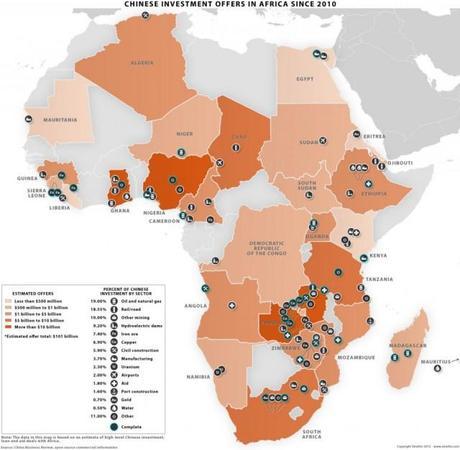
Source: Business Insider
By Brian Jackson
Recently, there have been many articles in the media outlining both the positive and negative implications of China’s growing investment in Africa. On one hand, many accuse China of promoting another period of colonization and exploitation on the continent and preventing Africa from becoming economically independent. Yet on the other hand, some praise the investments for rejuvenating African industries and infrastructure.
With such conflicting interpretations, many are left wondering how to view all of this. Is Chinese involvement in Africa a good thing, or bad thing? Will it lead to more economic and democratic opportunities for the continent and people, or the opposite?
In a Bloomberg story on Chinese arms sales to South Sudan, Ilya Gridneff outlines how the Chinese government recently canceled a $38 million contract between the Chinese arms corporation Norinco and the government of South Sudan, which has been embroiled in conflict. Chinese officials said it was “inappropriate to implement” the contract at the current time, with the country in the midst of a delicate peace process.
Although, it is worthy to note that the arms contract was signed before the country broke out in civil war, the perception of a Chinese firm fueling the conflict puts China’s government in a difficult situation, as it also maintains major investments in South Sudanese resources. When news of the arms shipment became public, NGOs argued that the weapons would help prolong a conflict that has already harmed China’s other, larger investments in South Sudanese oil.
While deeper economic ties have created opportunities for both China and its African partners, they also put pressure on the Chinese government to police the behavior of Chinese firms involved in conflict-prone areas.
China’s heavy investment in expanding Africa’s railways has also raised questions. One major project, the East Africa Railway, is seen as a historic event that will link the countries of Kenya, Uganda, Rwanda, Burundi and South Sudan. While there is a great need for such infrastructure projects in the region, with China financing 90 percent of the railway, there are concerns that most of the jobs will go to Chinese rather than African workers – and much of the money will return to Chinese firms in the form of massive procurements of rail cars and equipment, since the countries involved have agreed to build to Chinese railway standards. Similar concerns have arisen in other railway and infrastructure projects as well.
Yet, although this event seems great, a question that remains to be known is what will the effect of this railway be? Will it enhance economic growth and supply local jobs? Will it in some way promote democracy?
All in all, it remains to be seen how growing Chinese involvement in Africa will play out. There are many questions yet to be answered, and they depend largely on the outcome of these projects and events. Although China is providing many infrastructure opportunities, the majority of Chinese investment in Africa is soft loans, or projects that may not have a lasting effect on the population. For example, unlike aid from Western countries, Chinese investment has no requirements for government reform or anti-corruption efforts. Hence there are no regulations on how the aid and investment should be handled.
Time will tell what impact these investments have, especially if Chinese companies themselves run into the same governance and corruption obstacles that hinder local firms.
Brian Jackson is a Communications Intern at CIPE.

